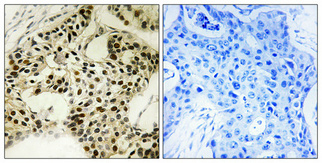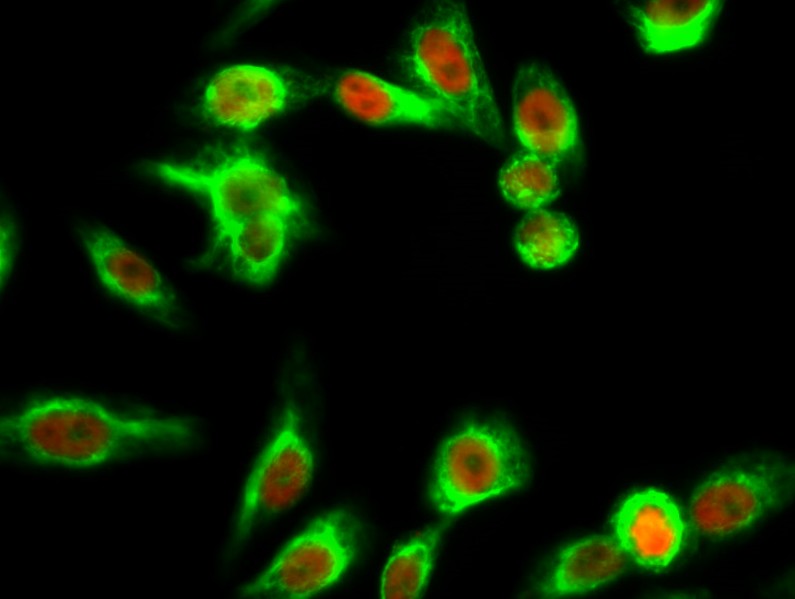Phospho LKB1 (T189) Cell-Based Colorimetric ELISA Kit
- Catalog No.:KA1368C
- Applications:ELISA
- Reactivity:Human;Mouse
- Gene Name:
- STK11
- Human Gene Id:
- 6794
- Human Swiss Prot No:
- Q15831
- Mouse Swiss Prot No:
- Q9WTK7
- Storage Stability:
- 2-8°C/6 months
- Other Name:
- Serine/threonine-protein kinase STK11 (EC 2.7.11.1) (Liver kinase B1) (LKB1) (hLKB1) (Renal carcinoma antigen NY-REN-19)
- Detection Method:
- Colorimetric
- Background:
- catalytic activity:ATP + a protein = ADP + a phosphoprotein.,cofactor:Magnesium or manganese.,disease:Defects in STK11 are a cause of Peutz-Jeghers syndrome (PJS) [MIM:175200]. PJS is a rare hereditary disease in which there is predisposition to benign and malignant tumors of many organ systems. PJS is an autosomal dominant disorder characterized by melanocytic macules of the lips, multiple gastrointestinal hamartomatous polyps and an increased risk for various neoplasms, including gastrointestinal cancer.,disease:Defects in STK11 have been associated with testicular tumors [MIM:273300]. It includes germ cell tumor (GCT) or testicular germ cell tumor (TGCT).,enzyme regulation:Activated by binding of a complex consisting of CAB39 and STRAD or CAB39 and ALS2CR2.,function:Essential role in G1 cell cycle arrest. Phosphorylates and activates members of the AMPK-related subfamily of protein kinases. Tumor suppressor.,online information:PJS entry,PTM:Phosphorylated by a cAMP-dependent protein kinase.,similarity:Belongs to the protein kinase superfamily.,similarity:Belongs to the protein kinase superfamily. CAMK Ser/Thr protein kinase family. LKB1 subfamily.,similarity:Contains 1 protein kinase domain.,subcellular location:Relocates to the cytoplasm when bound to CAB39 and STRAD or CAB39 and ALS2CR2.,subunit:Found in a ternary complex composed of SMAD4, STK11 and STK11IP. Interacts with SMAD4 and STK11IP.,tissue specificity:Ubiquitously expressed. Strongest expression in testis and fetal liver.,
- Function:
- protein amino acid phosphorylation, phosphorus metabolic process, phosphate metabolic process, cell cycle, cell cycle arrest, negative regulation of cell proliferation, regulation of cellular ketone metabolic process, phosphorylation,regulation of lipid metabolic process, regulation of fatty acid metabolic process, cell cycle process, regulation of cell proliferation, regulation of fatty acid oxidation,
- Subcellular Location:
- Nucleus. Cytoplasm. Membrane . Mitochondrion. A small fraction localizes at membranes (By similarity). Relocates to the cytoplasm when bound to STRAD (STRADA or STRADB) and CAB39/MO25 (CAB39/MO25alpha or CAB39L/MO25beta). Translocates to the mitochondrion during apoptosis. PTEN promotes cytoplasmic localization. .; [Isoform 2]: Nucleus . Cytoplasm . Predominantly nuclear, but translocates to the cytoplasm in response to metformin or peroxynitrite treatment.
- Expression:
- Ubiquitously expressed. Strongest expression in testis and fetal liver.
- June 19-2018
- WESTERN IMMUNOBLOTTING PROTOCOL
- June 19-2018
- IMMUNOHISTOCHEMISTRY-PARAFFIN PROTOCOL
- June 19-2018
- IMMUNOFLUORESCENCE PROTOCOL
- September 08-2020
- FLOW-CYTOMEYRT-PROTOCOL
- May 20-2022
- Cell-Based ELISA│解您多样本WB检测之困扰
- July 13-2018
- CELL-BASED-ELISA-PROTOCOL-FOR-ACETYL-PROTEIN
- July 13-2018
- CELL-BASED-ELISA-PROTOCOL-FOR-PHOSPHO-PROTEIN
- July 13-2018
- Antibody-FAQs


